
The Revolutionary Association of the Women of Afghanistan (RAWA) is a women's organization based in Kabul, Afghanistan, that promotes women's rights and secular democracy. It was founded in 1977 by Meena Keshwar Kamal, an Afghan student activist who was assassinated in February 1987 for her political activities. The group, which supports non-violent strategies, had its initial office in Kabul, Afghanistan, but then moved to Pakistan in the early 1980s.
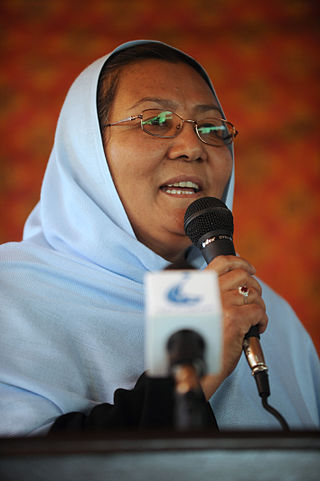
Dr. Habiba Sarābi is a hematologist, politician, and reformer of the reconstruction of Afghanistan after the Taliban first took power. In 2005, she was appointed as Governor of Bamyan Province - the first Afghan woman to become a provincial governor. She had served as Afghanistan's Minister of Women's Affairs and as Minister of Culture and Education. Sarabi was instrumental in promoting women's rights and representation and environmental issues. She belongs to the ethnic Hazara people of Afghanistan. Her last name is sometimes spelled Sarobi.
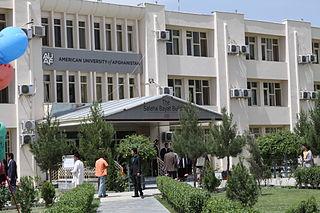
Education in Afghanistan includes K–12 and higher education, which is under the Ministry of Education and Ministry of Higher Education. In 2021, there were nearly 10 million students and 220,000 teachers in Afghanistan. The nation still requires more schools and teachers. Soon after the Taliban takeover of the country in August 2021, they banned girls from secondary education. Some provinces still allow secondary education for girls despite the ban. In December 2022, the Taliban government also prohibited university education for females in Afghanistan, sparking protests and international condemnation.

Lillias Anna Hamilton was a British medical doctor and writer. She was born at Tomabil Station, New South Wales to Hugh Hamilton and his wife Margaret Clunes. After attending school in Ayr and then Cheltenham Ladies' College, she trained first as a nurse, in Liverpool, before going on to study medicine in Scotland, qualifying as a Doctor of Medicine in 1890.
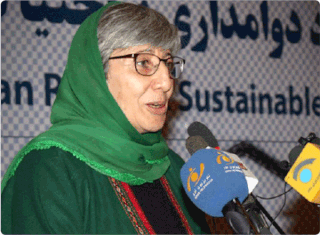
Sima Samar is an Afghan woman and human rights advocate, activist and medical doctor within national and international forums, who served as Minister of Women's Affairs of Afghanistan from December 2001 to 2003. She is the former Chairperson of the Afghan Independent Human Rights Commission (AIHRC) and, from 2005 to 2009, United Nations Special Rapporteur on the situation of human rights in Sudan. In 2012, she was awarded the Right Livelihood Award for "her longstanding and courageous dedication to human rights, especially the rights of women, in one of the most complex and dangerous regions in the world."
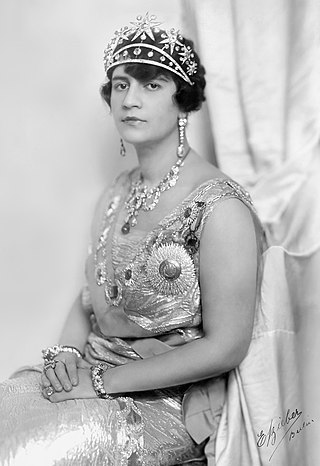
Soraya Tarzi was the first queen consort of Afghanistan as the wife of King Amanullah Khan. She played a major part in the modernization reforms of Amanullah Khan, particularly in regard to the emancipation of women.

Women's rights in Afghanistan have oscillated back and forth depending on the time period as well as the regime in power. After King Amanullah Khan's attempts to modernize the country in the 1920s, women officially gained equality under the 1964 Constitution. However, these rights were taken away in the 1990s through different temporary rulers such as the mujahideen and the Taliban during the Afghan civil war. During the first Taliban regime (1996–2001), women had very little to no freedom, specifically in terms of civil liberties. When the Taliban was overthrown by the United States following the 9/11 attacks, women's rights gradually improved under the presidential Islamic Republic of Afghanistan. Women were de jure equal to men under the 2004 Constitution.
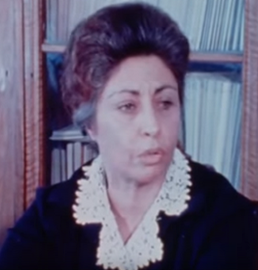
Anahita Ratebzad was an Afghan socialist and Marxist-Leninist politician and a member of the People's Democratic Party of Afghanistan (PDPA) and the Revolutionary Council under the leadership of Babrak Karmal. One of the first women elected to the Afghan parliament, Ratebzad was deputy head of state from 1980 to 1986.

Shahla Ata was an Afghan politician, congresswoman and one of two female candidates during Afghanistan's 2009 Presidential election. She told DiManno she and her family lived for 18 years in the United States. The Contender Biography published by Pajhwok Afghan News has her living in the United States from 1990 to1 1994, and living in Pakistan for the remainder of the period 1986 to 2001, where she administered relief to other Afghan expatriates.
Hamida Barmaki was a renowned Afghan law professor and human rights activist. She was killed together with her family in a suicide attack.

Zarifa Ghafari is a former female mayor of Maidan Shahr, capital city of the Wardak Province, Afghanistan. Ghafari was one of the few Afghan female mayors, next to the first Afghanistan's mayor, Azra Jafari and Khadija Zahra Ahmadi, and was also the youngest to be appointed, at the age of 24. She is known for her efforts to advance women's rights in Afghanistan. Ghafari was chosen as an International Woman of Courage in 2020 by the US Secretary of State. She has survived three assassination attempts.
Anjuman-i Himayat-i-Niswan was a women's organization in Afghanistan, founded in 1928. It was the first women's organization in Afghanistan.
Muassasa-i Khayriyya-i Zanan, also known as the 'Women's Society' and from 1975 called (Afghan) Women's Institute (WI), was a women's organization in Afghanistan, founded in 1946. It was also known as Da Mirmanech Tulaneh or Da Mermeno Tolana (DMT). It became independent of the government in 1975 and was renamed the "(Afghan) Women's Institute" or WI. From 1953, it published its own publication, Mirman.
Shafiqa Ziaie or Shafiqa Ziaye was an Afghan educator and cabinet minister. She belonged to the generation of pioneer women who attained public positions in Afghan society after the reforms of Mohammed Daoud Khan.
Alia Hafeez was an Afghan educator. She belonged to the generation of pioneer women who attained public positions in Afghan society after the reforms of Mohammed Daoud Khan.
Nafeesa Shayeq was an Afghan feminist. She belonged to the generation of pioneer women who attained public positions in Afghan society after the reforms of Mohammed Daoud Khan.

Asma Rasmya or Asma Rasmiya Khanum, was an Afghan editor, school principal and feminist. She has been referred to as the first female managing editor as well as the first female principal in Afghanistan. She was the mother of queen Soraya Tarzi and the mother-in-law of king Amanullah Khan.
Mirmon Ayesha, was an Afghan royal consort. She was married to Sher Ali Khan. She hailed from Lal Pur Afghanistan of the Momand tribe.
Mirmon Halima also known as Babo Jan or Bobo Jan, was an Afghan royal consort. She was married to Abdur Rahman Khan.
Princess Shah Gul Jahan also known as Kubra Jahan Begum but commonly called Princess Kubrah or Princess Kobra, was a royal princess of Afghanistan.










